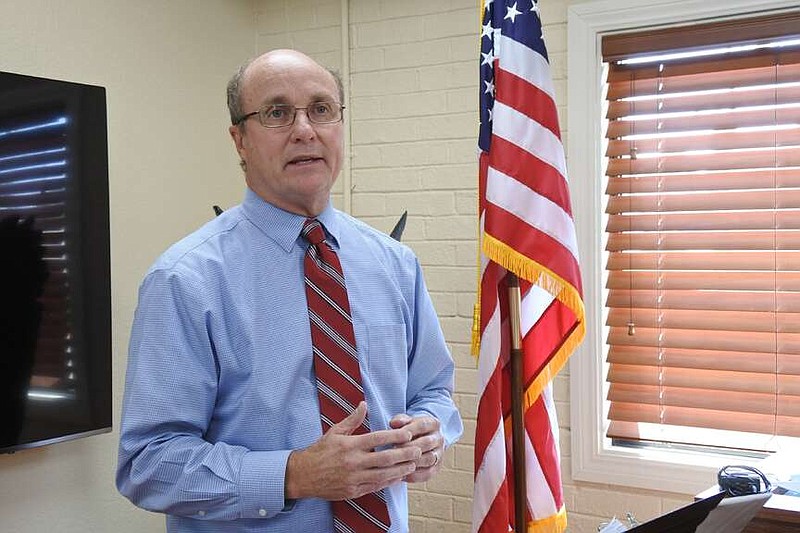Petitions in support of citizen-initiated ballot measures strengthening access to public records and meetings are being circulated, making an appearance Wednesday at the Garland County Tea Party's regular meeting.
The attorney general's office recently certified popular names and ballot titles for the Arkansas Government Transparency Amendment and The Arkansas Government Disclosure Act of 2024. Both will be on the ballot in the Nov. 5 general election if enough registered voters sign the petitions.
Fort Smith attorney Joey McCutchen said the stakes are high. He's been at the center of controversies involving the Arkansas Freedom of Information Act, suing numerous government bodies for violations of the law's open meetings provision. He and FOIA advocate Jimmie Cavin are leading the petition drive.
Cavin is listed as a member of the Arkansas Citizens for Transparency Committee, the group working to get the measures on the ballot. It had raised $1,705 through December, according to the financial report it filed with the state Ethics Commission last month. Former legislator Nate Bell and Little Rock attorney David Couch are listed as committee chairman and treasurer.
"This is all or nothing," McCutchen told the Tea Party. "We're reclaiming our rights. If we win, we're going to have the strongest FOIA in the country. If we lose in November, we will end up having the weakest FOIA in the country. They will come after FOIA, and it will be weakened and not recognized."
The petitions are in response to the Legislature amending the FOIA law during the special session the governor called in September. Lawmakers added an exemption for Arkansas State Police communications and records related to security the agency is statutorily mandated to provide the governor and his or her family.
The exemption shields records that "reflect the planning and or provision of security services provided" to the governor, the state's other constitutional officeholders, legislators, Supreme Court justices and Court of Appeals judges. The initial bill was much broader, exempting records that reveal deliberations behind governmental decisions and policies.
"The intent of the Arkansas Freedom of Information Act is that business and deliberation are done in public," Cavin said. "I understand it's a little more convenient, but the public's not looking for convenience. They want to see the sausage made."
The ballot title for the proposed statute defines a public meeting as "a communication between two or more members of a governing body for the purpose of exercising a responsibility, authority, power or duty of the governing body concerning official action."
McCutchen said he has persistently lobbied lawmakers to define the parameters of a public meeting, as courts have been reluctant to make a wholesale decree on what constitutes a meeting the public is entitled to attend under the FOIA law.
"I can tell you the Supreme Court has been no friend to open meetings," he said. "They look at it on a case-by-case basis. The last case I took to the Supreme Court totally confused what an opening meeting is."
McCutchen sued the city of Fort Smith over emails city directors exchanged regarding the city's Civil Service Commission, arguing the communications constituted an open meeting the public should have been notified of in advance. A circuit court agreed, but the high court reversed the order.
"They can't text between themselves or have secret email chains," McCutchen, referring to prohibitions in the proposed statute, said. "Under the current law, unfortunately, I think they probably can. At least three of them probably can. That's one of the reasons we need this. It defines what an open meeting is."
The initiated act would also repeal the law that allows school boards to meet in executive session for purposes of discussing settlement offers, contract disputes with superintendents, updates on pending litigation and real estate purchases. Passed last year, Act 883 was supported by Garland County's House delegation. Rep. Bruce Cozart, R-District 91, was the House sponsor.
"That bill made it through both houses of the Legislature, did not go before a committee, and was signed by the governor within one week's time," McCutchen said.
He said the proposed constitutional amendment and statute are complementary pieces, formidable in tandem but vulnerable on their own. The amendment repeals exemptions adopted during last year's special session and requires the Legislature to refer to the people laws that curtail transparency.
"If the Legislature wants to weaken FOIA, then it's going to require a two-thirds vote, then it's going to require a vote of the people," McCutchen said. "That's how strongly we feel about our right to know."
The statute expands the scope of the current FOIA law, including a civil penalty for people who violate the law.
"We have to have open government," McCutchen said. "We need this right enshrined in our Constitution, and we need these principles with the act. We have to have both."
